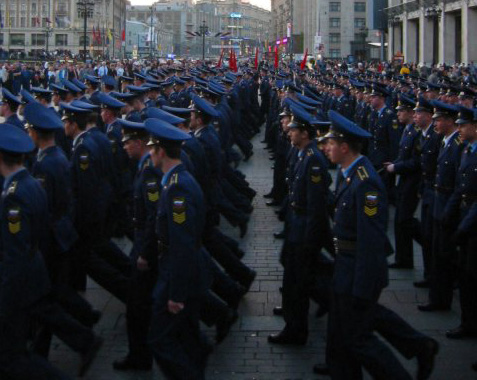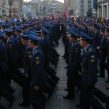
BUSH SUPPORTIVE, EU A BYSTANDER ON BALTIC VERSUS SOVIET VISION OF HISTORY
Publication: Eurasia Daily Monitor Volume: 2 Issue: 88
By:

On the eve of the Moscow celebrations of the Soviet victory in the Second World War, the Baltic states prepare to commemorate at home the event that sealed for them a half-century of captivity. The Kremlin expected to isolate the Baltic states by highlighting the difference between their assessment of the significance of 1945 and Moscow’s myth of the “anti-fascist coalition” rehashed for Western audiences.
The basic ingredients have remained constant from Soviet times to date in Moscow’s internal and international discourse regarding the Baltic states: equating the occupation with “liberation,” demonizing resistance to it as “fascism,” dismissing calls to come to terms with Soviet crimes and colonization as “attempts to rewrite history,” and proscribing such views as disruptive of cooperation between Russia and the West. “These countries, in our view, are what you might call bad boys,” Kremlin consultant Gleb Pavlovsky summed up the pre-anniversary line on the Baltic states (Newsweek, May 9).
These tactics have, on the whole, met with indifference from West European governments in the run-up to the Moscow anniversary celebrations. For its part, the European Union has carefully avoided any appearance of controversy with Russia ahead of the EU-Russia summit in Moscow on May 10. Ultimately it was U.S. President George W. Bush who identified with the Baltic states’ perspective — and, implicitly, with that of a large group of countries — in his May 4-released letters to the three Baltic presidents. “In Western Europe, the end of World War II meant liberation. In Central and Eastern Europe, it marked the Soviet occupation and annexation of Estonia, Latvia, and Lithuania and the imposition of communism,” Bush wrote, thus endorsing the two-outcomes thesis at the heart of the Baltic states’ assessment of 1945. His letter goes on to acknowledge the Baltic states’ contributions to U.S.-led missions in Afghanistan and Iraq, consolidation of democracy at home, and support for civil society development beyond the Baltic states’ borders. The U.S.-Baltic summit in Riga on May 6 will underscore the “freedom and security your nation[s] now enjoy,” Bush wrote to each of the three presidents ahead of the Riga meeting (BNS, May 4).
A handful of European officials have publicly and unambiguously rallied to the Baltic states’ assessment of the significance of 1945. Danish Prime Minister Anders Fogh Rasmussen and the European Commission’s Vice-President and Commissioner for Industry (hitherto for Enlargement), Guenther Verheugen, did so in the course of visits to the Baltic states this week. Both officials underscored the two-outcome thesis. Verheugen urged Europeans, “our relations [with Russia] must be based on truth. We should not hide the fact that the Baltic states were occupied against their will for a long time. We [Europeans] never fully recognized the fact that Estonians, Latvians, Lithuanians were the victims of crimes.” Noting that the accession of Baltic, Central, and East European countries to the EU is beginning to change Western Europe’s understanding of all-European history, Verheugen stated that he would deliver the same message as Bush at the Moscow summit (BNS, May 3; AFP, May 2).
Rasmussen encouraged Moscow to follow the German example in acknowledging and apologizing for past crimes and mistakes, specifically including those connected with Russia’s occupation of the Baltic states. This would facilitate reconciliation and improved relations between Russia and the Baltic states, Rasmussen advised, citing Western Europe’s experience. Some in Denmark — including critics within the government — noted that Rasmussen’s call for a Russian apology goes farther than the Baltic states’ position, which only seeks acknowledgement of the fact of the illegal occupation and ensuing crimes. (BNS, May 2, 3; AFP, May 3).




